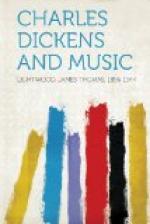When we came to ‘Here’s a hand, my trusty frere’ we all joined hands round the table; and when we declared we would ‘take a right gude willie waught,’ and hadn’t the least idea what it meant, we were really affected.
The memory of this joyous evening recurred to Mr. M. at a later date, after the feast in David’s rooms, and he calls to mind how they had sung
We twa had run about the braes
And pu’d the gowans
fine.
He confesses his ignorance as to what gowans are,
but I have no doubt that Copperfield
and myself would
frequently have taken a pull
at them, if it had been
feasible.
In the last letter he writes he makes a further quotation from the song. On another occasion, however, under the stress of adverse circumstances he finds consolation in a verse from ‘Scots, wha hae’,’ while at the end of the long epistle in which he disclosed the infamy of Uriah Heep, he claims to have it said of him, ‘as of a gallant and eminent naval Hero,’ that what he has done, he did
For England, home, and beauty.
‘The Death of Nelson,’ from which this line comes, had a long run of popularity. Braham, the composer, was one of the leading tenors of the day, and thus had the advantage of being able to introduce his own songs to the public. The novelist’s dictum that ’composers can very seldom sing their own music or anybody else’s either’ (P.P. 15) may be true in the main, but scarcely applies to Braham, who holds very high rank amongst English tenors. Another song which he wrote with the title ‘The Victory and Death of Lord Viscount Nelson’ met with no success. The one quoted by Micawber was naturally one of Captain Cuttle’s favourites, and it is also made use of by Silas Wegg.
The musical gifts of Mr. and Mrs. Micawber descended to their son Wilkins, who had ‘a remarkable head voice,’ but having failed to get into the cathedral choir at Canterbury, he had to take to singing in public-houses instead of in sacred edifices. His great song appears to have been ’The Woodpecker Tapping.’ When the family emigrated Mr. M. expressed the hope that ’the melody of my son will be acceptable at the galley fire’ on board ship. The final glimpse we get of him is at Port Middlebay, where he delights a large assembly by his rendering of ‘Non Nobis’ (see p. 149), and by his dancing with the fourth daughter of Mr. Mell.
The ‘Woodpecker’ song is referred to in an illustrative way by Mrs. Finching (L.D.), who says that her papa
is sitting prosily breaking
his new-laid egg in the
back parlour like the woodpecker
tapping.
Captain Cuttle
Captain Cuttle is almost as full of melody as Micawber, though his repertoire is chiefly confined to naval ditties. His great song is ‘Lovely Peg,’ and his admiration for Florence Dombey induces him to substitute her name in the song, though the best he can accomplish is ‘Lovely Fleg.’




